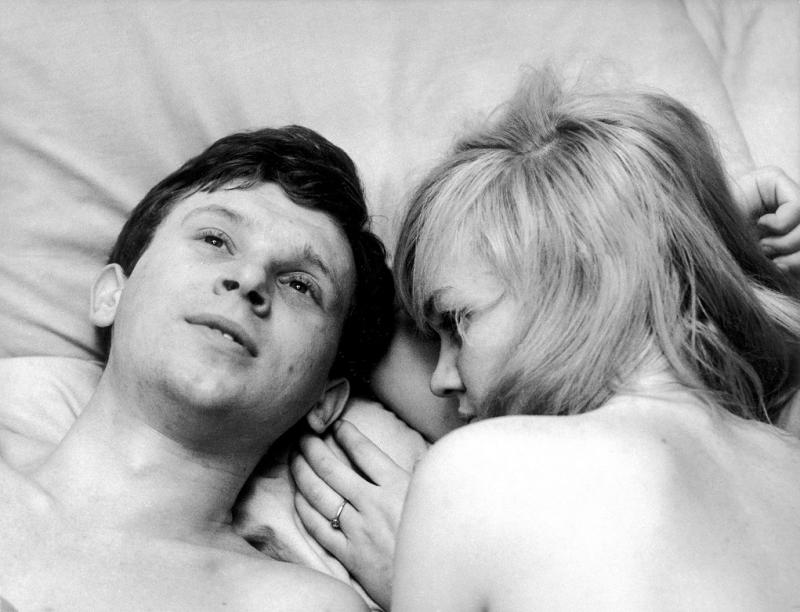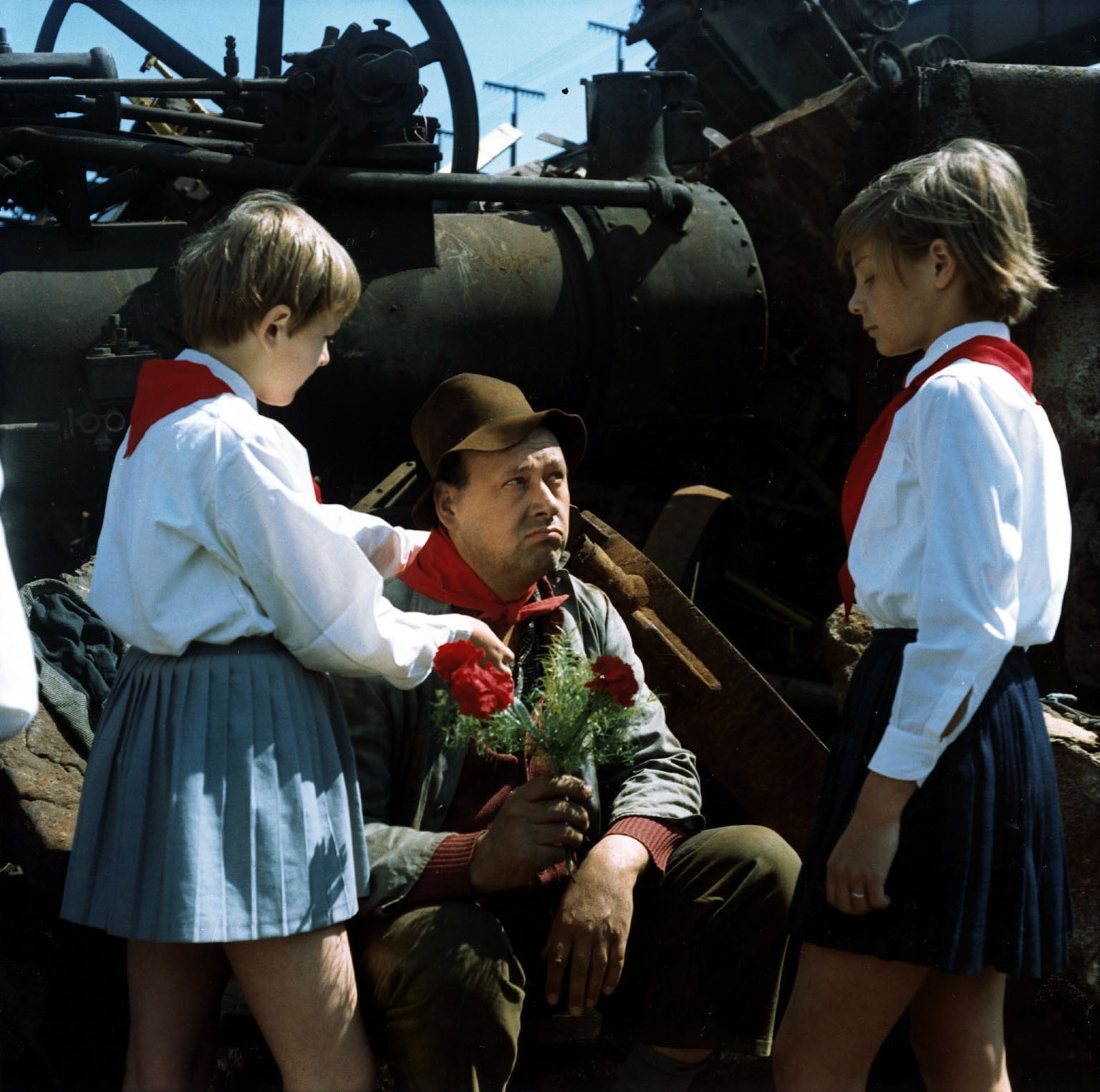DVD: The Czechoslovak New Wave - A Collection, Vol 2 | reviews, news & interviews
DVD: The Czechoslovak New Wave - A Collection, Vol. 2
DVD: The Czechoslovak New Wave - A Collection, Vol. 2
Three stylistically different films from one of the most remarkable cinema movements of the 20th century

Distributor Second Run’s second collection of the Czech New Wave (strictly speaking, Czechoslovak, although the three films included here are from the Czech side of the movement) reminds us what an astonishing five years or so preceded the Prague Spring of 1968. What a varied range of film-makers and filmic styles it encompassed, making any attempt to impose any external category – whether political or artistic – redundant.
The fate of the directors involved was as varied as the works they produced during that short-lived period of political thaw and formal experimentation. Many of those who remained in Czechoslovakia after the Soviet (Warsaw Pact) invasion saw their careers curtailed (relegation to television was a frequent fate), while others left the country and worked, with varying degrees of success, outside their homeland.
These tentative steps towards happiness never quite end up as hoped for
Miloš Forman is surely the foremost figure in the latter category. A Blonde in Love (Lásky jedné plavovlásky) from 1965 was his second feature, and the first to bring him international acclaim (including a Best Foreign Film Oscar nomination the following year). The 50th anniversary of its initial release confirms its position among the very top works of the movement: in fact, it surely ranks as one of the best films of the 1960s, period.
It’s intimate and funny at the same time, catching the fate of youthful hopes in a society which imposes pressures, direct or indirect, that contrive against their coming to fruition (no surprise that British director Ken Loach has repeatedly named it his favourite film). Life in a small town offers little for the hordes of young women working in its shoe factory, until the arrival of an army division brings hopes of greater social interaction. But Forman (and his co-writer and assistant director Ivan Passer) exquisitely capture the awkwardness of such developments; these tentative steps towards happiness never quite end up as hoped for, in scenes of comedy that are both agonising and delicious. (The central love scene between Andula and Mlida, pictured above, is both emotionally close and daring for its time).
Jan Němec’s 1966 The Party and the Guests (O slavnosti a hostech) is a more oblique film, notionally – though never quite directly – political. Němec wrote this quasi-parable with his wife (herself a remarkable costume-designer of the period) Ester Krumbachová, and cast many of the intelligentsia of his generation in supporting roles, a gesture that was lost on no-one. It’s the story of how a group of apparently carefree friends out in the country are accosted by a threatening crowd to be taken off to a mysterious birthday party on the banks of a lake, with each stage of their acquiescence becoming another step in their absorption into a group, “Party” mentality. At a little more than an hour, it’s a compressed study of the mentality of a society of control, mixed with a hint of Surrealism (we learn from film scholar Peter Hames’s filmed extra that Němec hadn’t apparently seen Buñuel, to whose work the film is much compared, when he made it), as well as elements of its local antecedent, Franz Kafka.
 Jiří Menzel’s masterpiece may be Closely Observed Trains, which won the director the Best Foreign Film Oscar in the fateful year of 1968, but his Larks on a String (Skřivánci na niti) from the following year comes a close second. The ranks of films from the period to be banned after the Soviet invasion is a long and honourable one – The Party and the Guests was actually banned twice, the second time “for eternity” – and Larks remained virtually unseen in the year of its release (bootleg videos apparently circulated widely in the 1980s, however), before it went on to win the Golden Bear at the 1990 Berlinale.
Jiří Menzel’s masterpiece may be Closely Observed Trains, which won the director the Best Foreign Film Oscar in the fateful year of 1968, but his Larks on a String (Skřivánci na niti) from the following year comes a close second. The ranks of films from the period to be banned after the Soviet invasion is a long and honourable one – The Party and the Guests was actually banned twice, the second time “for eternity” – and Larks remained virtually unseen in the year of its release (bootleg videos apparently circulated widely in the 1980s, however), before it went on to win the Golden Bear at the 1990 Berlinale.
As with Trains, Menzel was collaborating with the great Czech writer Bohumil Hrabal, in this case from a collection of his stories about the fate of those found undesirable by the incoming 1948 Communist regime, who were sent off to hard labour or the mines (a moment of interaction between the new and old generations, pictured above). It’s in one such location, a monumental scrap yard, that the film’s motley collection of apparent undesirables live out their lives, with rich (often tragi-comic) interaction between the sexes across the borders of their confinement.
Larks comes with a 10-minute special feature, a 7 Questions for Menzel which the director filmed himself, giving background to his life and work within the context of his country’s history. His final utterance seems a rather jaundiced comment on the films of the present day (this was filmed in 2011): they're an escape from real life, Menzel complains, they lack compassion. Definitely not accusations that could be levelled at the work included in this release.
rating
Share this article
The future of Arts Journalism
You can stop theartsdesk.com closing!
We urgently need financing to survive. Our fundraising drive has thus far raised £49,000 but we need to reach £100,000 or we will be forced to close. Please contribute here: https://gofund.me/c3f6033d
And if you can forward this information to anyone who might assist, we’d be grateful.

Subscribe to theartsdesk.com
Thank you for continuing to read our work on theartsdesk.com. For unlimited access to every article in its entirety, including our archive of more than 15,000 pieces, we're asking for £5 per month or £40 per year. We feel it's a very good deal, and hope you do too.
To take a subscription now simply click here.
And if you're looking for that extra gift for a friend or family member, why not treat them to a theartsdesk.com gift subscription?
more Film
 London Film Festival 2025 - a Korean masterclass in black comedy and a Camus classic effectively realised
New films from Park Chan-wook, Gianfranco Rosi, François Ozon, Ildikó Enyedi and more
London Film Festival 2025 - a Korean masterclass in black comedy and a Camus classic effectively realised
New films from Park Chan-wook, Gianfranco Rosi, François Ozon, Ildikó Enyedi and more
 After the Hunt review - muddled #MeToo provocation
Julia Roberts excels despite misfiring drama
After the Hunt review - muddled #MeToo provocation
Julia Roberts excels despite misfiring drama
 Ballad of a Small Player review - Colin Farrell's all in as a gambler down on his luck
Conclave director Edward Berger swaps the Vatican for Asia's sin city
Ballad of a Small Player review - Colin Farrell's all in as a gambler down on his luck
Conclave director Edward Berger swaps the Vatican for Asia's sin city
 London Film Festival 2025 - Bradley Cooper channels John Bishop, the Boss goes to Nebraska, and a French pandemic
... not to mention Kristen Stewart's directing debut and a punchy prison drama
London Film Festival 2025 - Bradley Cooper channels John Bishop, the Boss goes to Nebraska, and a French pandemic
... not to mention Kristen Stewart's directing debut and a punchy prison drama
 London Film Festival 2025 - from paranoia in Brazil and Iran, to light relief in New York and Tuscany
'Jay Kelly' disappoints, 'It Was Just an Accident' doesn't
London Film Festival 2025 - from paranoia in Brazil and Iran, to light relief in New York and Tuscany
'Jay Kelly' disappoints, 'It Was Just an Accident' doesn't
 Iron Ladies review - working-class heroines of the Miners' Strike
Documentary salutes the staunch women who fought Thatcher's pit closures
Iron Ladies review - working-class heroines of the Miners' Strike
Documentary salutes the staunch women who fought Thatcher's pit closures
 Blu-ray: The Man in the White Suit
Ealing Studios' prescient black comedy, as sharp as ever
Blu-ray: The Man in the White Suit
Ealing Studios' prescient black comedy, as sharp as ever
 The Woman in Cabin 10 review - Scandi noir meets Agatha Christie on a superyacht
Reason goes overboard on a seagoing mystery thriller
The Woman in Cabin 10 review - Scandi noir meets Agatha Christie on a superyacht
Reason goes overboard on a seagoing mystery thriller
 London Film Festival 2025 - crime, punishment, pop stars and shrinks
Daniel Craig investigates, Jodie Foster speaks French and Colin Farrell has a gambling habit
London Film Festival 2025 - crime, punishment, pop stars and shrinks
Daniel Craig investigates, Jodie Foster speaks French and Colin Farrell has a gambling habit
 I Swear review - taking stock of Tourette's
A sharp and moving tale of cuss-words and tics
I Swear review - taking stock of Tourette's
A sharp and moving tale of cuss-words and tics
 A House of Dynamite review - the final countdown
Kathryn Bigelow's cautionary tale sets the nuclear clock ticking again
A House of Dynamite review - the final countdown
Kathryn Bigelow's cautionary tale sets the nuclear clock ticking again

Add comment